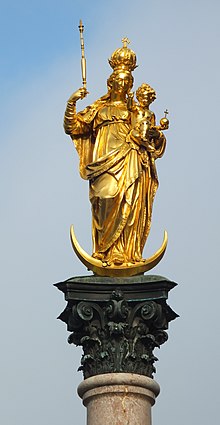Mariensäule
- View a machine-translated version of the German article.
- Machine translation, like DeepL or Google Translate, is a useful starting point for translations, but translators must revise errors as necessary and confirm that the translation is accurate, rather than simply copy-pasting machine-translated text into the English Wikipedia.
- Consider adding a topic to this template: there are already 9,156 articles in the main category, and specifying
|topic=will aid in categorization. - Do not translate text that appears unreliable or low-quality. If possible, verify the text with references provided in the foreign-language article.
- You must provide copyright attribution in the edit summary accompanying your translation by providing an interlanguage link to the source of your translation. A model attribution edit summary is
Content in this edit is translated from the existing German Wikipedia article at [[:de:Mariensäule (München)]]; see its history for attribution. - You may also add the template
{{Translated|de|Mariensäule (München)}}to the talk page. - For more guidance, see Wikipedia:Translation.



The Mariensäule (lit. 'Mary's Column') is a Marian column located on the Marienplatz in Munich, Germany. Mary is revered here as Patrona Bavariae (Latin: Protector of Bavaria).
History
It was erected in 1638 to celebrate the end of Swedish occupation during the Thirty Years' War, to be precise, following a respective vow by Duke Elector Maximilian I of Bavaria if the ducal residential cities of Munich and Landshut would be spared from war destruction. The column is topped by a golden statue of the Virgin Mary standing on a crescent moon as the Queen of Heaven, created in 1590. The figure was originally located in the Frauenkirche. Mariensäule in Munich was the first column of this type built north of the Alps and inspired erecting other Marian columns in this part of Europe.[1]
Features
At each corner of the column's pedestal is a statue of a putto, created by Ferdinand Murmann. The four putti are each depicted fighting a different beast, symbolizing the city's overcoming of adversities: war represented by the lion, pestilence by the cockatrice, hunger or famine by the dragon and heresy by the serpent.
The full inscription is as follows (with a translation)
| Latin | Translation |
|---|---|
DEO OPTIMO MAXIMO | TO GOD THE BEST AND GREATEST |
References
- ^ For more and detailed pictures of the column see the respective German language article on wikipedia.de.

48°08′14″N 11°34′32″E / 48.1372°N 11.5755°E / 48.1372; 11.5755











